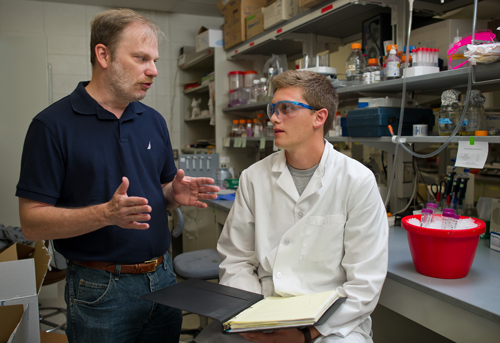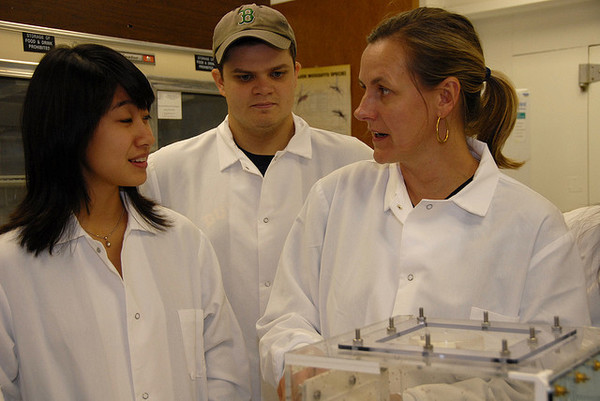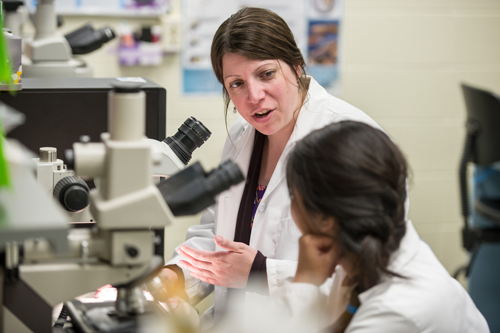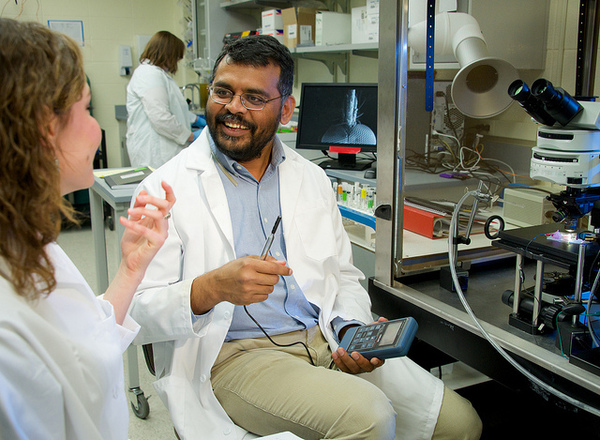Graduate Requirements




Graduate Courses
The following section provides a snapshot of our graduate program requirements. For further detail as well as the department's policies on various facets of graduate study, please consult the Graduate Studies Guide.
For the degree of Doctor of Philosophy in Biological Sciences, each student is expected to complete a 60-credit hour program. This requirement is composed of at least 12 credit hours of course work and the remainder as dissertation research. Of the 12 credit hours, students must earn 3 “seminar credits” over the course of their degree program. This requirement may be fulfilled by participation in a seminar course that allows them to present their research to a broad audience and therefore fulfill the annual oral presentation requirement. One of the three credits may be fulfilled by attending and presenting a talk at a national, or international conference, with approval from the DGS and the student’s advisor.
Through the combination of coursework and non-curricular activities, students demonstrate competency in the following six areas:
- Foundational Knowledge: Students demonstrate adequate foundational knowledge of discipline. The Graduate Advisory Committee and/or major advisor may require student to complete one or more foundational knowledge courses.
- Advanced Discipline Knowledge: Students must demonstrate adequate advanced knowledge of discipline. The majority of formal courses will be taken in this area. Specific course requirements will be set by the Graduate Advisory Committee.
- Professional Skills and Development: Students must demonstrate proficiency in proposal development, manuscript preparation, experimental design, and oral presentation. These skills can be acquired through formal course instruction, workshops, or informal instruction by graduate mentor. Proficiency will be determined by the Graduate Advisory Committee.
- Research Tools: Students must demonstrate proficiency of specific research tools as indicated by the Graduate Advisory Committee. Other skills can be acquired through formal course instruction, workshops, or informal instruction by the graduate mentor.
- Trans/Interdisciplinary Thinking: Students must engage in some form of trans- or inter-disciplinary thinking. This skill can be acquired through formal course instruction, workshops, or enrollment in an inter-disciplinary seminar course. Fulfillment of the requirement will be determined by the Graduate Advisory Committee.
- Ethics: Students must complete one formal course or workshop in Ethics training. This requirement may or may not count towards the credit hour requirements depending on the course/workshop that is completed. Any student supported on NSF or NIH funding must complete Responsible Conduct of Research (RCR) training as offered through the Graduate School.
Choosing an Advisor
If a student chooses an advisor prior to residence at Notre Dame, this faculty member will serve as the curriculum advisor for the student. Many students carry out two or three research rotations lasting approximately 6 to 7 weeks with faculty members during the first year to gain perspective from varied research laboratory experiences. If the student is rotating, the first rotation faculty member will serve as the Interim Advisor.
Annual Committee Meetings
Together with their faculty advisor, graduate students assemble a committee of faculty to provide guidance and feedback as they progress through the program. The student meets with the committee annually to present research and discuss objectives for the coming year.
Exams
Students must pass a Candidacy Comprehensive Examination (CCE) that covers foundational and advanced discipline knowledge. The CCE consists of two parts, a written proposal describing the student’s thesis research plans, followed by an oral defense of this proposal to their Advisory Committee. The proposal rigor and format should meet the requirements of an NSF Doctoral Dissertation Improvement Grant in the Directorate for Biological Sciences or in the format of an NIH Ruth L. Kirschstein National Research Service Award (NRSA). The subsequent oral defense assesses: (i) the student’s general knowledge of their field, and (ii) the strength of the student’s thesis research plans. These exams are taken in tandem because the written thesis proposal is a major basis of the oral exam. The CCE is completed by the end of the student’s 5th semester.
Students must pass a dissertation defense. When the research is completed, the student writes the dissertation, which is then read by the adviser and the students advisory committee. Upon approval, the student gives a final public oral presentation of the research, followed by an oral examination/defense of the research to the advisory committee.